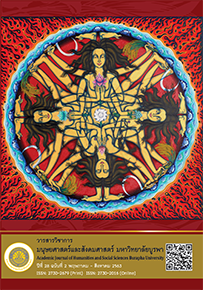Human Condition in Krishnamurti’s Philosophy
Main Article Content
Abstract
The purpose of the research is to study concepts of human condition in Krishnamurti’s philosophy from books, writings, video as well as the related research. The data was analyzed and synthesized systematically, and finally, presented in a descriptive manner.
The research findings were as follows: The human conditions in the philosophy of Krishnamurti can be viewed in many dimensions because all humans have their life conditioned by fears, ambitions, desires, confusions, envies and suffer confliction. Humans created this world with existence of self and the various senses from the conscious were obscured. Humans are deceived by the truth and knowledge, but they have the freedom to choose. Krishnamutri does not want people to accept his ideas. He encourages the awareness of self-consciousness; the mind should be investigative of the truth and honest without judgment. He believes in total awareness as being essential for a free mind.
Downloads
Article Details
บทความทุกบทความเป็นลิขสิทธิ์ของวารสารวิชาการมนุษยศาสตร์และสังคมศาสตร์ มหาวิทยาลัยบูรพาเท่านั้น
References
กฤษณมูรติ. (2543). แด่หนุ่มสาว (พจนา จันทรสันติ, แปล). กรุงเทพฯ: มูลนิธิโกมลคีมทอง.
กฤษณมูรติ. (2545). เผชิญความจริง (หิ่งห้อย ณภูเขา, แปล). กรุงเทพฯ: อมรินทร์พริ้นติ้งแอนด์พับลิชชิ่ง.
กฤษณมูรติ. (2549). อนาคตของมนุษย์อยู่ตรงไหน (พยับแดด, แปล). กรุงเทพฯ: อมรินทร์พริ้นติ้งแอนด์พับลิชชิ่ง.
กฤษณมูรติ. (2553). กฤษณมูรติและโลกท่ามกลางวิกฤต (นันทนิจ บำรุงทรัพย์, แปล). นนทบุรี: ภาพพิมพ์.
กฤษณมูรติ. (2556). การศึกษาและสาระสำคัญของชีวิต (นวลคำ จันภา, แปล). กรุงเทพฯ: อมรินทร์พริ้นติ้งแอนด์พับลิชชิ่ง.
กฤษณมูรติ. (2560). กระจกเงาแห่งความสัมพันธ์ (สภาวะรับรู้อันไร้การเลือก 2) (หิ่งห้อย ณ ภูเขา, แปล). กรุงเทพฯ: อมรินทร์พริ้นติ้งแอนด์พับลิชชิ่ง.
ฐนกร กันต์กริน. (2562). Fear ความกลัว. เข้าถึงได้จาก https://www.youtube.com/watch?v=qQ2n0xfv_T4&feature=share&fbclid=IwAR0SZzLFt
ธารตวัน บุญยพรหม. (2552). ศึกษาเชิงวิเคราะห์ความตายในทัศนะของกฤษณมูรติ. รายงานการศึกษาอิสระศิลปศาสตรมหาบัณฑิต, สาขาวิชาปรัชญา, บัณฑิตวิทยาลัย, มหาวิทยาลัยขอนแก่น.
ปิยณัฐ ประถมวงษ์. (2554). วาทกรรมความรู้ในงานเขียนของกฤษณมูรติ. วิทยานิพนธ์ศิลปศาสตรมหาบัณฑิต, สาขาวิชาปรัชญา, บัณฑิตวิทยาลัย, มหาวิทยาลัยเชียงใหม่.
พระมหาสาธิต ฐิตธมฺโม. (จันทะคาม). (2555). การศึกษาเปรียบเทียบมโนทัศน์เรื่องชีวิตและความตายในพุทธปรัชญาเถรวาทกับกฤษณมูรติ. วิทยานิพนธ์พุทธศาสตรมหาบัณฑิต, สาขาวิชาปรัชญา, คณะพุทธศาสตร์, มหาวิทยาลัยมหาจุฬาลงกรณราชวิทยาลัย.
ศุภชัย ศรีศิริรุ่ง. (2515). สภาพของมนุษย์ (human condition). เข้าถึงได้จาก https://philosophy-suansunandha.com/2015/06/23/existentialism/
สุวรรณา เจริญธนากิต. (2549). ตัวตนในทัศนะของกฤษณมูรติ. วิทยานิพนธ์ศิลปศาสตรมหาบัณฑิต, สาขาวิชาปรัชญา,บัณฑิตวิทยาลัย, มหาวิทยาลัยเชียงใหม่.
สุวินัย ภรณวลัย. (2550). ยอดคนมหาโยคะ. กรุงเทพฯ: มังกรบูรณา.
อุดมเดช รัตนบัญญัติ. (2552). การศึกษาเปรียบเทียบการเจริญสติของหลวงพ่อเทียน จิตฺตสุโภ กับความรู้สึกตัวของจิทฑุ กฤษณมูรติ. วิทยานิพนธ์ศิลปศาสตรมหาบัณฑิต, สาขาวิชาศาสนาเปรียบเทียบ, บัณฑิตวิทยาลัย, มหาวิทยาลัยมหิดล.
Krishnamurti. (2012). What is meditation (truth and actuality). Retrieved from https://www.youtube.com/watch?v=8b9E9gz3yTE.
Skitt, D. (2017). To be human. India: Replika Press.


